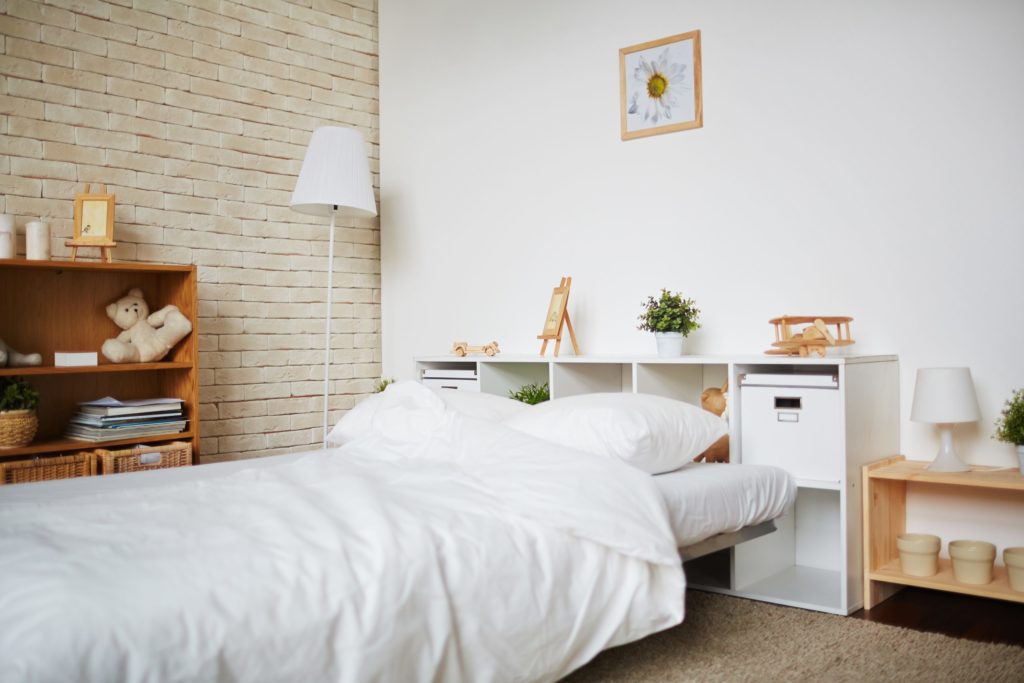The color and lighting in your bedroom sets the tone for your sleep, so avoid anything that resembles a computer screen’s blue light. Cover up those LED clocks, turn off any screens at least an hour before bedtime, and invest in some high quality blackout curtains for more darkness.
Create a peaceful space for napping between the sheets.
The ideal bedroom is a healing sanctuary. Your bedroom should have a peaceful ambiance that can be sensed as soon as you walk in the door.
It’s true that your bedroom will most likely serve more than one purpose. It’ll also host birthdays, weddings, holidays and other family gatherings. But when it’s time to get some zzz’s, I want to be able to waltz into my bedroom and let the worries of the day melt away immediately upon entering.
Everything you need to get started is here.
Let us know if we can help you further on Facebook or Twitter.
The mystery of sleep, along with its powers over our lives, has always been fascinating to me. I’ve spent loads of time researching the biological aspects of sleep, slowly mapping out its precise functions, uncovering the current state-of-the-art knowledge in neuroscience.
In an attempt to share those findings with you, here are three of the most important factors I’ve found that contribute to a good night’s rest.
Sleep is not simply about drifting off for eight hours and then waking up refreshed. In order for sleep to be beneficial, it must be both deep and rejuvenating— yielding stress relief, increasing mental performance and restoring the body’s natural balance. Your bedroom has a major impact on your ability to fall asleep quickly and stay asleep throughout the night.
In fact, your bedroom is one of the only spaces in your home where you can create a safe cocoon for yourself. The idea of sleeping in anything other than our own homes has all but been lost to history.
When we sleep at home, our bedrooms are packed with blankets, pillows, duvets and comforters that help us stay warm during the winter and cool during the summer, but many of us fail to understand all the benefits of sleeping under sheets that surround us like a breathable tent.
Even sleeping outside is considered a foreign concept- why would you want to be exposed to the elements without a roof overhead? On the contrary, being under covers during winter and outside during summer is nature’s way of providing protection from the elements. In our technologically advanced age, we have lost touch with this aspect of sleeping in nature, but it provides many benefits that go beyond temperature regulation.
Sleeping on a firm surface has been found to promote blood circulation and be more beneficial for our muscles than sleeping on an uncomfortable mattress or futon.
In addition, sleeping on a bed is an incredibly comfortable and safe way of falling asleep.
Because we don’t get any natural sunshine while sleeping, we are more prone to getting sick when sleeping under the sun or in direct sunlight during the day.
But because we are sleeping indoors, this becomes less of a problem. Sleeping in light means that our body’s pineal gland will release melatonin, which calms us down and induces sleep.
What counts most for a good night’s rest is the last thing you do before bedtime. In order for your body to go into a deep sleep, you must be fully relaxed and comfortable in your bedroom.
Once inside, I’m sure you’ll want to conquer those cobwebs that are holding all the dust in your bedroom captive, so we’ve collected some of our favorite tools for eliminating all types of clutter.
Avoid heavy curtains in your bedroom.
During the winter months, it’s best to stop using heavy curtains for two reasons: first, heavy curtains can affect your body’s temperature control system since the heaviness of your curtains pulls more heat from the room into your body, and second, during those summer months you may be tempted to open a window in order to stay cool and use an air-conditioner. This can both affect the humidity of your room and make you feel even hotter.
